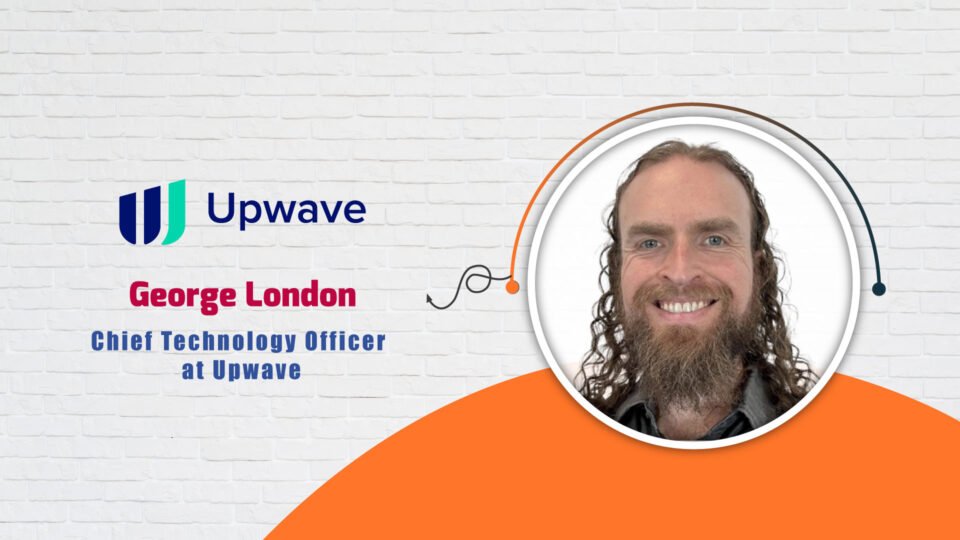Discover George London’s professional journey and insights on AI-driven strategies in an exclusive AITech interview with the CTO of Upwave.
Greetings George, Could you please share with us your professional journey and how you came to your current role as Chief Technology Officer at Upwave?
My professional journey has been a bit unconventional. I studied philosophy at Yale, not expecting to go into tech. I ended up working as an investment analyst, doing a lot of data analysis and model building on topics like how government stimulus impacts the economy.
Realizing finance wasn’t my passion, I started a music startup that ultimately didn’t pan out. Nearly 8 years ago, I joined Upwave as a software engineer focused on data. Over time, I became manager of our data team, director of engineering, VP of engineering, and now CTO overseeing all product and technology.
Given the urgency of embracing AI-driven strategies, how has Upwave integrated artificial intelligence into its operations to drive innovation and maintain a competitive edge?
AI is deeply integrated into everything we do at Upwave. We’ve long used what I call “predictive AI” – machine learning techniques that have existed for decades. From the beginning, we built ML and statistical analysis algorithms to optimize ad campaigns.
In the last year and a half, we’ve also embraced the newer “generative AI” exemplified by tools like ChatGPT. Over the past 9 months, we’ve leveraged generative AI to help customers get more value from the brand measurement we provide. Just yesterday, we launched the open beta of our AI Campaign Insights Reports, which use generative AI to synthesize and summarize campaign results into easy-to-understand language, charts, and actionable recommendations. We’re very excited about it.
Revolutionizing brand ROI through marketing measurement is a critical aspect of modern business. Could you provide insights into Upwave’s approach to this and the impact AI-driven marketing analytics have had on enhancing brand performance?
Modern brand campaigns are extremely complex, with vast amounts of money spent across dozens or even hundreds of channels. It’s simply too much for humans to track and optimize manually. That’s where AI shines – at digesting huge datasets to find mathematical optimizations and make concrete recommendations to improve cost-effectiveness and ROI.
Upwave takes a two-pronged AI approach: First, using predictive AI for high-quality measurement and clear analysis of ROI opportunities. Second, leveraging generative AI to communicate those opportunities to customers as clearly and actionably as possible.
We’ve found that customers who lean into this data-driven, AI-powered approach are seeing dramatic performance improvements and ROI increases. The combination of unique data, insightful analysis, and powerful communication enabled by AI is a game-changer.
As the CTO at Upwave, what are your insights into the future of brand analytics, and how do you foresee AI shaping the landscape in the coming years?
I’m a huge believer in the potential of generative AI. It’s easy to assume today’s capabilities are all these systems will ever have, but having worked in AI for over 15 years, I’ve seen firsthand how these tools continuously improve in compounding, accelerating ways. I’m very bullish.
Even if AI never advances further, it will still become widely deployed across brand advertising – analytics, media planning, creative, and so on. But these tools will only get more powerful over time, perhaps dramatically so.
I anticipate AI will substantially augment more and more day-to-day activities in advertising. Organizations that embrace AI, understand how to harness it, and adapt their workflows will become far more productive, efficient, and effective. Those resistant to change will be left behind.
The transformative potential of GenAI is fascinating. How do you anticipate AI advancements surpassing human capabilities and reshaping marketing content creation strategies at Upwave?
As I said, I expect these AI tools to improve dramatically over time, taking on more functions humans currently handle. But I see this more as AI augmenting rather than replacing humans.
Consider how a bulldozer is far more efficient than a human at clearing a construction site, yet you still have a human operating the bulldozer. One human with a bulldozer can now do the work of dozens or hundreds in far less time.
I expect a similar dynamic with AI – it will replace certain aspects of jobs humans do, but humans will still orchestrate the AI to achieve their goals, just far more efficiently. People will be able to produce more and better advertising, then use tools like Upwave to measure performance and continuously optimize in a virtuous cycle.
So while advertising will become much more automated, there will still be an important role for humans in guiding the process.
In your role as Chief Technology Officer, what personal strategies do you employ to stay informed about the latest advancements in AI and technology, ensuring Upwave remains at the forefront of innovation?
I’m rather obsessive about keeping up with AI given how transformative I believe it will be for both tech and advertising.
For me, this means firsthand experience – regularly using tools like ChatGPT, Claude, Anthropic, paying for premium versions, participating in hackathons to build hands-on AI projects. I even recently won the TED AI hackathon with a team.
Secondly, I stay closely involved with Upwave’s AI product development, frequently discussing capabilities and limitations with our engineers and PMs.
To track the cutting edge, for all its issues, I find Twitter an excellent source of direct info from top researchers. I also subscribe to several great newsletters that summarize key AI news.
It takes a multi-pronged approach as the AI field is moving extremely rapidly, but falling behind would be a huge risk.
What advice would you offer to our audience, particularly businesses seeking to integrate AI-driven strategies into their marketing and brand analytics efforts?
Take AI very seriously. It’s going to significantly impact nearly every business. Yes, there are dodgy “AI” products and snake oil salesmen out there, but that doesn’t negate the genuine value being created by real AI capabilities. And these tools are only going to get better over time.
Even if AI can’t perfectly solve your needs today, that may change by next month. Effectively applying AI still takes skill, and initial attempts may not pan out, but that doesn’t mean AI can’t provide huge value with the right approach.
I strongly recommend building real AI expertise, either in yourself or your organization. Understand both the potential of today’s tools and how that will evolve going forward. Your competitors certainly are. Allowing them to gain an AI advantage now risks them leaving you in the dust as that edge compounds.
So be discerning, but don’t dismiss AI. The risk of ignoring it is too great.
With your extensive experience in technology and marketing, what key considerations should companies keep in mind when implementing AI solutions for marketing purposes?
First, be thoughtful about applying AI to problems. Naively throwing AI at an issue without carefully considering the problem space and the model’s constraints can lead to reputational or even legal issues, as these systems can be erratic.
However, you also can’t overcorrect and entirely avoid AI just because it involves some risk. Throughout history, many valuable technologies have been dangerous when misused but extremely beneficial when wielded properly.
Within 5 years, I believe it will be nearly impossible to remain competitive in marketing without heavy AI usage. Building those capabilities now will be key to keeping pace.
Even with today’s AI tools, if applied effectively, there is substantial potential to unlock. Tools like Upwave can help you increase your ROI by 2-3 times, for instance. So there’s already a lot of value to capture from existing tools, and that will only grow.
Can you share a success story or milestone where Upwave has effectively utilized AI-driven strategies to enhance brand ROI or marketing performance?
Absolutely. While I can’t name names, Upwave offers Persuadability Scores which directly measure brand advertising’s impact, similar to tracking clicks or conversions for direct response.
We worked with a major financial services advertiser and DSP to feed in these AI-generated metrics, allowing the DSP to steer ads towards the highest-impact, best-ROI opportunities. The result was material performance improvements for campaigns using these Persuadability Scores. That’s a great example of predictive AI boosting marketing effectiveness.
On the generative AI side, our new AI Campaign Insights Reports provide easily digestible summaries and recommendations that enable customers to align internal stakeholders and optimize in-flight campaigns.
The substantial leverage of generative AI makes it far more time and cost efficient to perform the necessary analysis and communication to understand campaign performance and disseminate those insights to key decision-makers. We’re seeing strong customer uptake and satisfaction so far.
Finally, considering your expertise, what are your reflections on the future of AI in marketing, and any additional insights you’d like to share with our audience?
As I’ve touched on, AI capabilities are going to advance substantially, likely in ways that eventually unsettle people as AIs become able to handle much of the work humans currently do. In certain domains, AIs will simply outperform even the most skilled humans.
This means very significant changes are coming to marketing and advertising, whether we want them or not. These are global technological forces beyond any individual company’s control.
In this sense, an AI tsunami is approaching. We can either learn to surf that wave or get crushed by it, but we can’t stop it.
So it’s crucial for businesses of all kinds to very seriously consider how they’ll navigate the AI-transformed future and hopefully leverage AI as a competitive advantage. Because organizations that fail to appreciate the gravity of this shift are in for an extremely challenging decade ahead.

George London
Chief Technology Officer at Upwave
George is a seasoned technology leader who has spent his whole career helping companies use data to make better decisions. George started his career doing macroeconomic modeling and investment research at Bridgewater Associates (the world’s largest hedge fund), and then founded a startup that used data to help consumers explore and discover music.
As one of Upwave’s first engineering hires, George originally joined Upwave with the mission of building Upwave’s statistical capabilities from scratch. Since then he’s grown with the company to become Head of Data, then Vice President of Engineering, and now CTO. In his years at Upwave, George has both contributed to nearly every aspect of Upwave’s systems and product and has also hired, managed, and coached Upwave’s entire technical team.
George holds a BA in Philosophy from Yale University and lives in Oakland with his wife and labradoodle.

